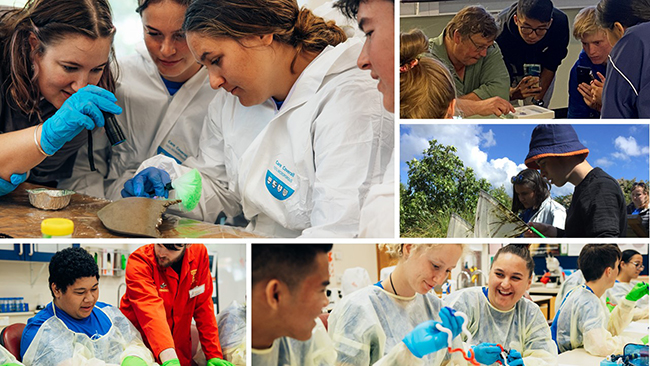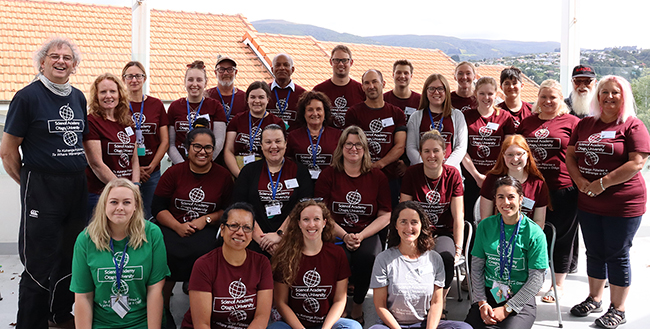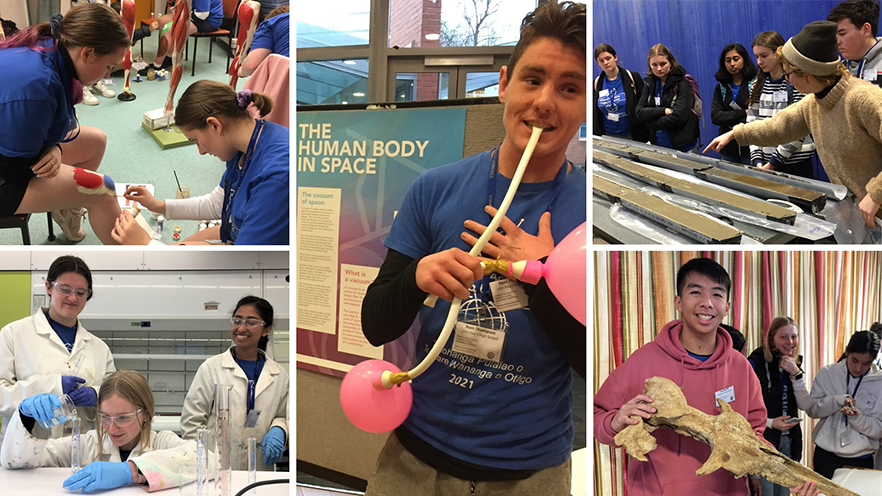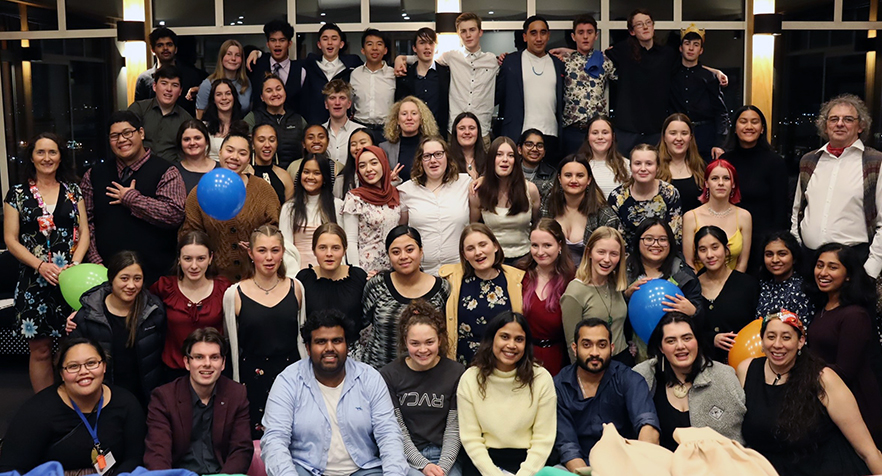January 2021 Summer Camp
“Everything and everybody were amazing”.
Our 2021 Summer camp ran from 17–23 January with a cohort of 50 super-keen, potentially high achieving science students from rural/provincial/small or lower decile schools across New Zealand.
Students are housed in single-room accommodation at Arana College on the University campus.
After an evening of icebreaker team building activities led by our team of senior university 'Greenshirt' mentors, there followed the usual packed programme of morning seminars, two-day projects, short electives, science communication workshops and free-time options (see Timetable below).
The morning seminars addressed topics such as:
- Using genomics to track COVID-19 in New Zealand
- Discovering how the brain works
- Facts are boring… Give them a Story!
- Antarctica: How does one take a trip to “The Ice”?
Two-day projects are divided into two streams with students choosing one option from each stream.
Project Stream A
- Applied Mathematics & Statistics
- Chemistry
- Anatomy & Physiology
- Marine Science
Project Stream B
- Genetics
- Physics
- Sport & Exercise Science
- Zoology
See our projects page for details
In addition, our students choose a short 3-hour elective on a topic not normally covered as part of the school curriculum. We are excited this year to be able to offer three new electives – Archaeology, Botany and Forensic Science – in addition to Ag@Otago, Pharmacology, Psychology, Quantum Physics and Toxicology.
The ever popular field trip on the MV Monarch around Taiaroa Head provided a welcome break mid-week. Sadly, rain forced us to cancel the usual outdoor barbeque and sports evening afterwards with indoor activities and games keeping everyone laughing till lights-out.
Students also get a 3-hour break from 3-6pm during which they can sign up for fun activities around Dunedin or just chill out at the accommodation.
An introduction to some basic science communication skills is a key component of the Science Academy and these are covered during evening interactive workshops. Students choose from one of four science communication streams:
- Interpretive Science Talks
- Science Radio Podcasting
- Introduction to Science Filmmaking
- Museum Science Communication
Between January and July camps, students work in teams or individually on a project that will be presented to a public audience at the end of the July camp as part of the NZ International Science Festival.

The week ends off with a chance to get the glad rags on and dance the night away at a Friday night party.
A big thanks goes out to all our project and elective leaders, Greenshirt mentors, Arana College staff and of course our students whose passion, hard work and gratitude are what makes the science Academy such a worthwhile programme. We look forward to welcoming them all back in July for our Winter Camp.
Teacher professional development programme
The Science Academy also runs a professional learning and development (PLD) programme for secondary science teachers in January each year. We target this PLD towards teachers who are based in small schools, rural/provincial locations or low decile schools (6 or below). Teachers travel to Dunedin and spend two full days and two half days, participating in a wide range of learning workshops.
In January 2021, a group of 23 teachers from all over New Zealand attended our PLD programme. From forensic science and physics in sport to citizen science and crime scene investigations, it was an action packed programme of hands-on activities. To find out more about the workshops they attended, see the link below.
 Science teachers (in red shirts) who participated in our 2021 workshops, along with senior student helpers (green shirts) and University of Otago staff.
Science teachers (in red shirts) who participated in our 2021 workshops, along with senior student helpers (green shirts) and University of Otago staff.
July 2021 Winter Camp
During the week of 11-17 July 2021, this year's cohort of Year 13 students returned to the University of Otago campus for another week of curriculum-focussed seminars, labs and workshops.
As the July camp ran during university semester time, we were unable to stay on campus and instead were hosted by Tolcarne Boarding Residence with its spectacular views over Dunedin city.
Camp week this year also coincided with the NZ International Science Festival (NZISF). Students were treated to extra events, with visits to the Virtual Reality Room and Our Moon exhibit with its 4.5m diameter suspended moon globe.

The July camp programme included four morning seminars, a wide range of two-day practical lab projects, short electives, science communication workshops and free-time options.
The morning seminars addressed topics such as:
- What makes a successful transition from Secondary to Tertiary?
- Edible insects: Yum or yuck?
- Using Traditional Knowledge to inform the future
- Palaeontology – Exploring Life in Deep Time
The two-day projects were divided into two streams, with students choosing one option from each stream. These projects are facilitated by University teaching staff, providing students with insight into how practical learning happens at tertiary level.
Projects in Stream A
- Applied Mathematics and Statistics
- Chemistry
- Anatomy and Physiology
- Marine Science
Projects in Stream B
- Biochemistry
- Geophysics
- Sport and Exercise Science
- Zoology
See our Projects page for more details
In addition, students attended a different three-hour elective from the one they experienced in January. A new elective in Forensic Science was introduced this year, in addition to Agricultural Science, Pharmacology, Psychology and Toxicology.
Mid-week we had a whole afternoon dedicated to “Transition to Tertiary” learning. Information sessions were provided by staff from the University's Careers and Course Advice offices. The Schools' Liaison team presented a very useful workshop about applying for scholarships and residential colleges. Sound advice on surviving first year was shared by our Greenshirt mentors who are all current students at Otago University. The session ended with an afternoon tea which was also attended by 10 of our Science Academy Alumni (previous students) who are now studying at Otago.
Our evening Science Communication workshops at the July camp were dedicated to putting the final edit on projects which students have been working on since January. These included interpretive talks, museum presentations, short films and audio podcasts, all within a science context. On Friday, we hosted the annual Science Academy Expo where students showcased their final presentation to a public audience – this year as part of the NZ International Science Festival programme.
The audience were treated to a selection of informative talks and excellent short films on a variety of science topics. Museum students talked about their displays on outer space and interstellar travel. A programme of longer science podcasts was provided for the audience to listen to at their leisure. Links to recordings of the films and podcasts can be found on our blog:
The week ended with a delicious formal dinner provided by the kitchen staff at Tolcarne Residence, followed by prize-giving and a chance to celebrate after a very busy week. Many thank-yous were shared, including a surprise gift of chocolate necklaces for the key staff involved in the programme from the students.

July 2021 winter camp attendees on the final night of camp.
The focus now shifts to online learning support by way of 10 weekly tutorials in Biology, Physics and Chemistry in the run-up to practice exams and the NCEA externals in November.
A huge “thank you” to everyone involved in running the July Camp programme and to the 46 students who attended. We hope you all learned more about science, communicating and how to be patient when travel plans don't go according to plan!